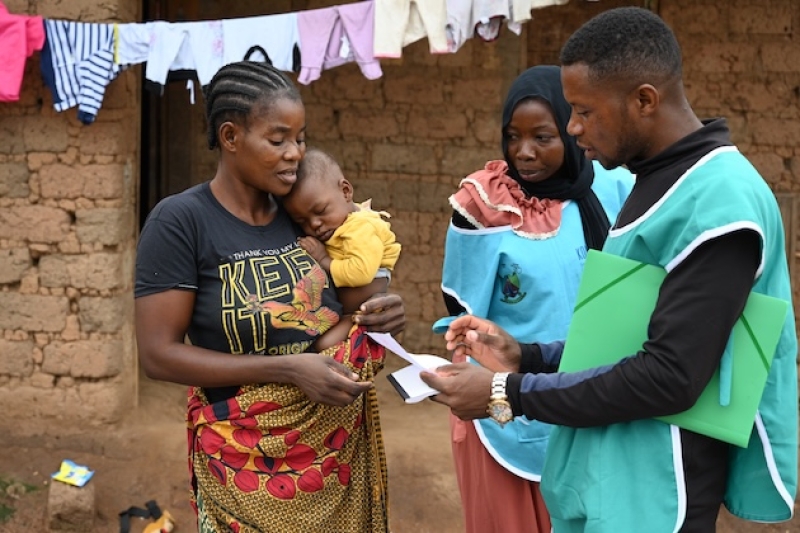- CA Yunus pays homage to Liberation War martyrs on Victory Day |
- Bangladesh capital market extends losing streak for second day |
- Bangladesh celebrates Victory Day Tuesday |
- 'Different govts presented history based on their own ideologies': JU VC |
Urgent Action Needed to Boost Global Birth Registration

A mother receives her child’s birth certificate in Bindia, East Cameroon. ©UNICEF/Dejongh
Registering the birth of a newborn—routine in many countries—has profound, lifelong implications for a child’s health, protection, and well-being. After initial gains this century, the global birth registration rate has declined over the past decade, particularly in parts of the Pacific and Sub-Saharan Africa.
To reverse this trend, experts stress the importance of adopting new registration technologies, strengthening political will, and improving parental awareness.
Currently, around 75 percent of children under five are registered globally, up from 60 percent in 2000, according to UNICEF. However, progress has slowed.
"Rapid population growth, especially in Sub-Saharan Africa, is outpacing registration systems. Weak infrastructure, limited funding, and low political prioritization have also contributed to the stagnation," said Bhaskar Mishra, Child Protection Specialist at UNICEF headquarters in New York. “Families often face barriers such as high fees, complex procedures, and limited access.”
East Africa and the Pacific Islands continue to face serious challenges. Birth registration rates are 41 percent in East Africa and 26 percent in the Pacific Islands. Rates are especially low in countries like Tanzania (29%), Papua New Guinea (13%), Somalia (3%), and Ethiopia (3%).
Globally, of 654 million children under five, about 166 million are unregistered and 237 million lack birth certificates.
COVID-19 has worsened the situation, reversing prior gains. Mishra emphasized that efforts must be accelerated fivefold to achieve universal birth registration by 2030, in line with the Sustainable Development Goals (SDGs).
Progress in Papua New Guinea
Papua New Guinea (PNG), a country of 11 million people, faces enormous geographic challenges, with many rural communities cut off by mountains and poor infrastructure. Over 80 percent of the population lives in rural areas.
In Madang Province, the Country Women’s Association has worked to raise awareness among pregnant women. “Some mothers must travel hours over rough roads to reach health facilities—or give birth in remote villages with no staff or equipment,” said Tabitha Waka from the association’s Madang Branch.
Poor infrastructure, lack of information, and traditional customs further hinder birth registration.
Despite challenges, PNG has made progress. From 2023 to 2024, the number of birth certificates issued more than tripled—from 26,000 to 78,000. UNICEF provided 44 mobile registration devices, enabling outreach to remote areas. In December, the PNG Parliament passed a bill to establish a national Civil and Identity Registry.
“The Pangu-led government is committed to inclusive policies and reliable identity systems,” Prime Minister James Marape said in November.
Still, logistical hurdles remain. “Only one person in PNG is authorized to manually sign birth certificates,” said Paula Vargas, UNICEF’s Chief of Child Protection in PNG. “Reaching the goal of registering half a million births annually will require scaling up technology and decentralizing services.”
Challenges in Ethiopia
In Ethiopia, which has a population of over 119 million and a birth rate of 32 per 1,000, rural regions lag behind cities. In the capital, Addis Ababa, the birth registration rate is 24 percent, but in rural SNNP (Southern Nations, Nationalities, and Peoples’ Region), it is just 3 percent—the national average.
Although registration is free, the process often requires multiple visits, long travel, and associated costs, which deter rural parents.
Dr. Tariku Nigatu of the University of Gondar suggested integrating registration with health services, investing in infrastructure, and using real-time technology to improve coverage.
UNICEF has supported Ethiopia in deploying mobile registration kits to reach remote and unstable areas, including those affected by the Tigray conflict. This ensures children born during emergencies are not left without legal identity.
Cultural beliefs also play a role. “Some communities believe registering a baby early brings bad luck,” said Nigatu, noting the country’s high neonatal mortality rate.
Legal Identity: A Key to Protection
Birth registration is vital not just for identity, but also for protecting children from exploitation, abuse, child labor, and trafficking. Without it, children may face difficulties accessing education, legal protection, jobs, and property rights.
However, registration alone is not enough. “It only works when linked to strong systems and services like immunization, hospital births, and school enrollment,” said Mishra.
Accurate birth and population data are also essential for governments to plan services and track progress on the SDGs.

